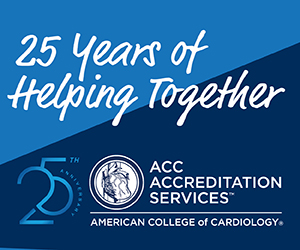
- Program Spotlight:
High-Impact Virtual Sessions for Busy Leaders Like You - AI-Based Solutions Are Essential to Optimization
- ACHE Celebrates 2023 Publishing Award Recipients
- Winners of Stull Essay Competition and Other ACHE Awards Honored at Congress
- Don’t Miss These Podcasts From Congress Keynote Speakers
- CMS Releases Summary of ‘Make Your Voice Heard’ Results
Program Spotlight:
High-Impact Virtual Sessions for Busy Leaders Like You
To meet today’s challenges in healthcare, leaders must be engaged, informed and equipped with practical solutions and strategies. However, increased demands on our time—and financial constraints—can make it difficult to keep up with your professional development.
If you were unable to join the 5,000-plus attendees who recently traveled to Chicago for ACHE’s 2023 Congress on Healthcare Leadership, the 2023 Virtual Leadership Symposium may be just what you need to gain meaningful insights and updates on trends, solutions and issues in healthcare. During this 1.5-day event, Tuesday, May 9, through Wednesday, May 10, busy healthcare leaders like you can learn from and engage with more than 30 influential voices in healthcare as they address the most pressing issues facing our field today. You’ll gain practical solutions and strategies to improve the health of your community, workforce and organization while earning up to 6 ACHE Face-to-Face Education credits. Check out the following high-impact virtual sessions, specially curated for you:
Tuesday, May 9
Join David Schreiner, PhD, FACHE, president/CEO, Katherine Shaw Bethea Hospital, for “Building Your Leadership Image Through Supercharged Engagement.” He’ll share research-based strategies for supercharging engagement with key constituents such as board members, executives, colleagues, physicians, staff members and community members.
Explore how state executive and legislative branches have aligned opioid use disorder public health policies to existing best practice standards during “Assessing Health System Response to the Opioid Crisis.” Carrie Shaver, DHA, assistant professor, Health Management, Administration and Policy, New Mexico State University, and Richard A. Greenhill, DHA, FACHE, director, Bachelor of Science in Health Management program/assistant professor, Texas Tech University Health Sciences Center, will also discuss how health systems can evaluate their responses to opioid use disorder through review of the application of state-level policies at the community level, and describe pathways forward.
“Leadership Insights: Resilient Supply Chains of the Future” will feature leaders from across the healthcare supply chain ecosystem, including Eric Tritch, vice president, Supply Chain and Support Services, UChicago Medicine. They’ll describe the top supply chain challenges facing the healthcare field today and will identify examples of successful innovations in supply chain management.
Wednesday, May 10
Take the first step toward creating a more motivated, engaged and productive healthcare team by joining Brian R. Spisak, PhD, research associate, National Preparedness Leadership Initiative, Department of Health Policy and Management, Harvard University, and John Whyte, MD, CMO, WebMD, for “Leadership Insights: Empowering Your Healthcare Team—Strategies for Managing Job Demands and Enhancing Well-being.” They’ll share how to use self-determination and job-demands resource theories to recognize the individual needs and desires of healthcare workers, and how to align those needs with organizational objectives.
“Driving Quality, Performance and Alignment Between Physicians and Hospitals” will address how to create systemwide bylaws, rules and regulations. Raul H. Zambrano, MD, FACHE, senior consultant, and Mary J. Hoppa, MD, vice president, Bylaws and Governance, both with Chartis Clinical Quality Solutions, will identify how aligned medical staff governance documents benefit the operational efficiency of the credentialing and privileging process and peer review, and how a unified medical staff benefits organizational decision-making.
Learn more about the 2023 Virtual Leadership Symposium and register today to take advantage of the early bird rate, available until April 24.
AI-Based Solutions Are Essential to Optimization
Optimizing capacity for constrained resources like operating rooms, inpatient beds and staff requires successfully matching supply with demand. This is among healthcare's most difficult and important challenges, and addressing it requires equally powerful solutions.
Traditionally, healthcare organizations have attempted to optimize capacity using approaches that rely on static reports instead of dynamic, predictive data. This view can result in extended patient wait times for surgeries and discharges, limited throughput and wasted financial resources. There are also opportunities to improve inconsistent shifts and workloads, which can exacerbate burnout for nurses and other caregivers.
With advances in artificial intelligence and insights gleaned from other industries, hospitals and health systems are now equipped to much more precisely match supply and demand to optimize scarce resources. To schedule surgical cases more efficiently, for instance, OR leadership can leverage AI to detect surgeons’ booking and utilization patterns, set probability thresholds for leaving unused time, and alert surgeons and schedulers to release time that is unlikely to be used. Taking these actions helps ORs accommodate higher case volumes and schedule patients more quickly.
Hospitals can also approach inpatient capacity planning more proactively, using AI to anticipate future bed availability, then match this to demand and discharge predictions in real time. As a result, patients can be admitted and go home in a timely manner as hospitals are creating more bed capacity and streamlining discharge processes. By predicting likely surgical caseloads, patient volumes and inpatient flow, leadership can assign nurses and staff levels optimally and promote appropriate workloads.
Discover how healthcare leaders are currently deploying AI to increase patient access, improve staff and provider satisfaction, and drive higher financial outcomes in this white paper from healthcare AI expert LeanTaaS.
LeanTaaS, an ACHE Premier Corporate Partner, provided the content above.
ACHE Celebrates 2023 Publishing Award Recipients
Congratulations to the winners of this year’s ACHE publishing awards, presented during the 2023 Congress on Healthcare Leadership.
- Thomas A. Atchison, EdD, was named the winner of the 2023 James A. Hamilton Award for his book Reigniting Employee Engagement: A Guide to Rediscovering Purpose and Meaning in Healthcare (Health Administration Press, 2021). This award is given annually to the author(s) of a management or healthcare book judged outstanding by ACHE’s Book of the Year Committee.
- Jason Zupec, PharmD; Jennifer N. Smith, PharmD; Natalie Fernandez; Shelley Otsuka, PharmD; and F. Greg Lucado Jr. were named winners of the 2023 Edgar C. Hayhow Award for their article “Potential to Decrease Hospital Readmission Reduction Program Penalty Through Pharmacist Discharge Visits,” published in the January/February 2022 issue of the Journal of Healthcare Management. ACHE grants this award annually to the author(s) of an article judged as the best among those published in the Journal of Healthcare Management.
- K. Kelly Hancock, DNP, RN, and Chad V. Minor, FACHE, were named winners of the 2023 Dean Conley Award for their article “Pandemic Hastens Cleveland Clinic’s Unified Well-Being Strategy,” published in the fall 2021 issue of the Frontiers of Health Services Management. ACHE grants this award annually to recognize contributions to healthcare management literature and to encourage healthcare executives to write and publish articles.
Other award winners honored at Congress are acknowledged in this issue, the March 27 issue and in subsequent issues of ACHe-news. General information about ACHE awards can be found on the “ACHE News and Awards” webpage.
Winners of Stull Essay Competition and Other ACHE Awards Honored at Congress
Recipients of the following ACHE awards were also recognized during the 2023 Congress on Healthcare Leadership:
2023 Richard J. Stull Student Essay Competition in Healthcare Management
Six students—three graduates and three undergraduates—were recognized for their winning essays submitted for the 2023 Richard J. Stull Student Essay Competition in Healthcare Management. The purpose of the competition is to stimulate and demonstrate the ability of future healthcare leaders to identify and describe important issues and developments in their chosen profession.
Graduate Division
- First place: Rebecca Wade, Hofstra University, for “Climate Change and Healthcare: Creating a Sustainable and Climate-Resilient Health Delivery System.”
- Second place: Anusha Sivendra, George Washington University, for “A Path to Operationalizing Diversity, Equity, and Inclusion in Healthcare Organizations.”
- Third place: Ashley Detherage, Vanderbilt University, for “Leveraging Nurse Retention Strategies to Combat the Nursing Shortage.”
Undergraduate Division
- First place: Megan E. Watkins, Auburn University, for “Designing an Effective Organizational Culture to Guard Against the Cyber Risks of Emerging Technologies.”
- Second place: Blair Lee Hinckle, James Madison University, for “A Comprehensive Framework for Solving Health Disparities by Addressing Physician Mistrust in the United States.”
- Third place: Jesse L. Roberson, University of Alabama, for “Improving Addiction Treatment Through Administrative Reform.”
2023 Higher Education Network Award Winners
The Higher Education Network Awards Program recognizes undergraduate and graduate programs participating in the ACHE Higher Education Network that have demonstrated the highest level of ACHE engagement.
- Graduate program winner: Baylor University, Waco, Texas.
- Undergraduate program winner: DeSales University, Center Valley, Pa.
ACHE Leader-to-Leader Rewards Program Top Achievers
These individuals recruited and advanced the greatest number of members in 2022 through the ACHE Leader-to-Leader Rewards Program. This program recognizes ACHE Members with reward points when they recruit colleagues and encourage current Members to advance to Fellow.
- Hospitals, health systems and other healthcare-related settings category: Wesley Marsh, FACHE, operations manager, Department of Neurosurgery, University of Florida Health Jacksonville, and the ACHE Regent for Florida—Northern and Western.
- Academic category: Thomas C. Crawford, PhD, FACHE, system COO, Medical University of South Carolina, Charleston, S.C.
- Uniformed Services/Veterans Affairs category: MAJ Joshua P. Moser, FACHE, CFO, U.S. Army.
Modern Healthcare Health Care Hall of Fame
Modern Healthcare, in conjunction with ACHE, honored its 2023 Health Care Hall of Fame inductees at the 2023 Congress. Learn more about the award and this year’s inductees, including Sister Carol A. Keehan, DC, HFACHE, who was named an ACHE Honorary Fellow in 2020.
Other award winners honored at Congress are acknowledged in this issue, the March 27 issue, and in subsequent issues of ACHe-news. General information about ACHE awards can be found on the “ACHE News and Awards” webpage.
Don’t Miss These Podcasts From Congress Keynote Speakers
The 2023 Congress on Healthcare Leadership was a memorable and meaningful forum for healthcare leadership. If you weren’t able to attend (we missed you!), you can still listen to recent Healthcare Executive Podcast episodes with some of this year’s incredible keynote speakers.
Discover how revolutionary digital health tools are shaping healthcare delivery and driving increased consumerism in healthcare decisions with Vin Gupta, MD, senior principal scientist and CMO of new health initiatives at Amazon.
Join Amy Webb, founder and CEO of the Future Today Institute, for a discussion that raises questions about what healthcare might look like in the next 10 or 20 years, and how healthcare leaders can balance immediate priorities with planning for the future.
In another episode, Ben Nemtin, co-founder of The Buried Life, shares ways his message of “radical possibility” can help leaders better support their organization’s workforce.
Visit HealthcareExecutive.org/Podcast for more discussions, insights and perspectives from some of the most knowledgeable names in healthcare management.
CMS Releases Summary of ‘Make Your Voice Heard’ Results
The Centers for Medicare & Medicaid Services released a summary of the results from its “Make Your Voice Heard” request for information, issued last year. The request for information sought public input on four topic areas:
- Accessing healthcare and related challenges.
- Understanding provider experiences.
- Advancing health equity.
- The impact of waivers and flexibilities in response to the COVID-19 public health emergency.
Individual stakeholders and organizations submitted over 4,000 comments in response to the request. CMS says it gained valuable public insights and that this information will inform its work and better support the populations it serves.



